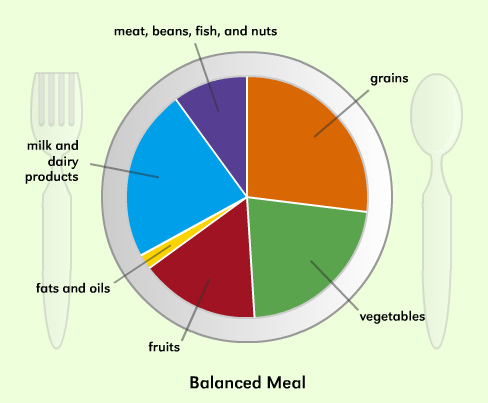I recently reviewed Maria Montessori’s The Montessori Method. Although there were some interesting ideas about pedagogy, the other element that stood out was how outdated some of the science discussed has become. Although this occurred in several different spots, it was most prominent in the section on nutrition. For example:
The diet of little children must be rich in fats and sugar.
As you can see above in the current suggestions for a balanced meal, fats represent the smallest section, while sugar doesn’t make an appearance.
Soups, purees, and meat balls, should constitute the ordinary form of dish for the child’s table… A child from two or three years of age ought to be constituted chiefly of milk and eggs, but after the second year broths are also to be recommended. After three years and a half meat can be given; or, in the case of poor children, vegetables.
Children must never eat raw vegetables, such as salads and greens, but only cooked ones; indeed they are not to be highly recommended either cooked or raw, with the exception of spinach which may enter with moderation into the diet of children. (emphasis mine)
Furthermore, vegetables are recommended only for poor children, and should always be cooked, never raw. The text is not exceedingly clear on why this is the case – of course, it doesn’t go into a great deal of detail in explaining the suggestions, rather than simply making them. It’s important to note that Montessori was a physician who specialized in pediatric medicine, so this isn’t random advice, and likely reflects the standards of the time.
My initial reaction was mild shock; I found it hard to believe that nutrition was viewed this differently a mere 100 years ago. However, the more I have reflected on it, the less surprising it really is. Even today, there is much we don’t fully understand about nutrition, and I have to wonder how our current standards would look to those reading about them 100 years from today.
Milk fresh from the cow, and the egg while it is still warm, are assimilable to the highest degree. Cooking, on the other hand, makes the milk and egg lose their special conditions of assimilability and reduces the nutritive power in them to the simple power of any nitrogenous substance.
Assimilability? Nitrogenous substance? These aren’t terms I’ve even heard in relation to diet before. Warm eggs eaten raw? Really?
What I realized while reading this chapter is that I’ve never before read an extremely out-dated scientific work. I have read a lot of historic philosophy, but the bad science that sometimes happened to be a part of it was never much the focus – there was other more relevant philosophy to focus on. The situation is somewhat similar here – diet is really only tangentially relevant to the methods Montessori is writing about.
The bottom line: this was a stark reminder exactly how quickly we’re learning more and more about ourselves and the world around us – and should emphasize how important it is to keep an open mind and willingness to accept change.

Actually her recommendations are prescient. Fat is an important component in a young child’s diet. Not only do they need the supply of energy to support rapid growth, many necessary vitamins are fat soluble. Vegetables, especially in the raw form, are difficult for young children to digest. For instance, young children cannot convert beta carotene (from carrots or sweet potato) to true vitamin A. Egg yolk is best consumed fresh and raw in order to preserve nutrients, just as is milk. Broth is a good source of easily absorbed iron (very important for brain development in young children) as well as a variety of other minerals and nutrients. Finally, meat was expensive during Montessori’s days and probably out of financial reach as an everyday food for the poor.